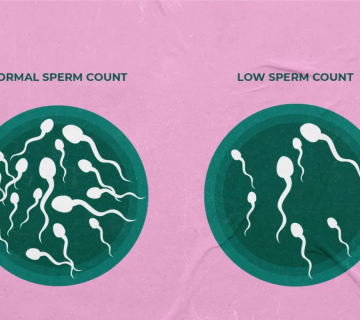
Irregular Periods: Understanding the Ups and Downs of Your Cycle
Irregular periods can be confusing, frustrating, and sometimes even scary. One month, your period might arrive right on schedule. The next, it may show up late or not at all. These ups and downs can leave you wondering what’s going on in your body. If you’ve ever felt alone in your concerns, rest assured you are not. In fact, a small poll of 200 women conducted in early 2025 revealed that almost 60% had experienced at least one irregular period in the past year.
In this in-depth guide, we will explore the causes, symptoms, and hidden factors behind irregular menstruation. We will also share practical steps you can take to promote a more balanced cycle. By the end, you’ll have a deeper understanding of how your lifestyle, environment, and body chemistry all play a role in your menstrual health. Whether you’ve just noticed changes in your cycle or have been battling irregular periods for years, this article is here to offer fresh insights you might not find elsewhere.
What Are Irregular Periods?
Irregular periods refer to menstrual cycles that don’t follow a consistent pattern. A typical menstrual cycle can last anywhere from 21 to 35 days, counting from the first day of your period to the start of the next. When your cycle length varies widely—sometimes 20 days, sometimes 40 days—you may be dealing with irregular periods.
Common Signs of Irregular Cycles
-
Cycle Length That Changes a Lot
✔️ More than eight days difference from cycle to cycle
✔️ Periods that come unexpectedly early or very late -
Sudden Changes in Flow
✔️ Very heavy bleeding on some months (menorrhagia)
✔️ Very light bleeding (hypomenorrhea) in other months -
Skipping Periods
✔️ Going more than three months without bleeding (amenorrhea) -
Spotting Between Periods
✔️ Light bleeding at random times
When these events happen once in a while, it might not be a big deal. But if they become frequent, it’s wise to pay closer attention.
The Typical Menstrual Cycle Timeline
While each person’s cycle can be unique, here’s a quick breakdown of a “typical” 28-day cycle:
- Menstrual Phase (Days 1-5): The uterine lining sheds, causing bleeding.
- Follicular Phase (Days 1-13): The pituitary gland releases hormones that help your follicles (in the ovaries) grow.
- Ovulation (Day 14): An ovary releases a mature egg.
- Luteal Phase (Days 15-28): Your body prepares for pregnancy. If fertilization doesn’t happen, hormone levels drop, and a new cycle begins.
If your cycle doesn’t follow this general pattern, you’re not alone. Many people have longer or shorter cycles, and small differences aren’t necessarily a problem. However, large and constant changes may signal an underlying issue.
Main Causes of Irregular Periods
Irregular menstruation can happen for many reasons. Some are straightforward—like high stress—while others might be more involved, such as an undiagnosed medical condition. Below are the most common causes experts have identified.
Hormonal Imbalances
- Estrogen and Progesterone Shifts: These hormones must be in balance for a normal cycle. An excess or shortage of one can cause timing changes.
- Polycystic Ovary Syndrome (PCOS): PCOS often leads to higher levels of androgen hormones. This can disrupt ovulation and cause irregular periods or even missed periods.
Stress and Emotional Factors
Your body doesn’t always separate mental stress from physical danger. If your stress hormones (like cortisol) remain high for too long, they can interfere with reproductive hormones. In the poll mentioned earlier, 60% of participants said they believed high stress was the main reason for their irregular cycles.
Lifestyle and Nutrition
- Sudden Weight Gain or Loss: Quick changes in body weight can affect estrogen and disrupt your cycle.
- Over-Exercising: Vigorous training without enough rest can reduce body fat and hormone levels.
- Poor Nutrition: Diets lacking key nutrients like iron, calcium, or essential vitamins may affect your period’s regularity.
Medical Conditions (PCOS, Thyroid Problems, etc.)
- PCOS: As noted, PCOS is a leading cause of irregular periods due to hormonal imbalances.
- Thyroid Disorders: Overactive or underactive thyroid function can change how your body manages hormones, often resulting in irregular periods.
- Uterine or Ovarian Health Issues: Polyps, fibroids, or cysts can also disrupt normal cycles.
Contraceptives and Medications
- Birth Control Pills: Some pills cause lighter or less frequent bleeding. Others might make your cycle more regular, and if you skip or miss pills, irregularity can happen.
- Intrauterine Devices (IUDs): Hormonal IUDs can lead to lighter, irregular bleeding, while copper IUDs can make periods heavier or longer.
- Other Medications: Certain antidepressants, steroids, or even some supplements may affect hormone levels.
Uncommon Factors You Might Not Know
Many articles discuss stress, PCOS, or weight changes, but some lesser-known issues can also throw your cycle off-balance. Here are three factors that rarely get the spotlight.
Gut Health Connection
A growing body of research shows that having a healthy gut microbiome might help keep your hormones balanced. When “good” bacteria thrive in your digestive system, they can assist your body in managing estrogen. If the gut is out of balance, it might lead to estrogen dominance or deficiency, which can cause irregular periods.
What You Can Do:
- Eat more fiber-rich foods (oats, beans, vegetables)
- Include fermented foods (yogurt, kefir, kimchi) to boost good bacteria
- Consider a high-quality probiotic supplement after talking with your doctor
Environmental Toxins
Some chemical substances found in plastics, pesticides, or personal care products (like parabens and phthalates) can mimic hormones in the body. These are called “endocrine disruptors.” They may alter estrogen or other hormone levels, potentially leading to menstrual irregularities.
What You Can Do:
- Choose glass or stainless steel containers over plastic
- Read product labels for “paraben-free” or “phthalate-free” options
- Wash fruits and vegetables to remove pesticide residues
Digital Addiction and Sleep Disruption
Have you ever stayed up too late scrolling on your phone? Blue light from screens can reduce your body’s melatonin production, which can disturb your sleep cycle. Poor sleep has been linked to hormonal imbalances, including those that regulate your period.
What You Can Do:
- Limit screen time before bed
- Use “night mode” or “dark mode” on devices
- Practice good sleep hygiene (consistent bedtimes, a dark room, no caffeine late in the day)
Signs You Should See a Doctor
While mild irregularities aren’t always alarming, there are times when medical advice is essential:
- Three or More Missed Periods in a Row (and you’re not pregnant)
- Severe Pain or Very Heavy Bleeding (changing pads or tampons every hour)
- Sudden, Extreme Changes in your cycle length or flow
- Other Worrisome Symptoms such as sudden hair growth on your face, unexplained weight changes, or extreme fatigue
If you’re unsure whether your symptoms are serious, scheduling a check-up for peace of mind is never a bad idea.
Expert Advice You Can Trust
Even though irregular periods are common, each body is unique. Three specialists from different fields share their insights below:
“When a patient comes to me concerned about cycle irregularities, the first thing I do is look at her stress load. Emotional well-being can play a giant role in keeping hormones in harmony.”
— Orion Nightingale, Hormone Health Practitioner
“Some of my clients often forget that good nutrition and balanced gut bacteria are big players in hormone regulation. Everything in the body is connected.”
— Ophelia, Nutritionist
“Hormone testing can offer a clear snapshot of what’s happening behind the scenes. It’s not just about estrogen and progesterone; issues with the thyroid or other glands can also affect cycles.”
— Caspian Sterling, Endocrinologist
Practical Strategies for Balancing Your Cycle
There’s no one-size-fits-all answer, but certain lifestyle choices can improve menstrual regularity. Remember that small, consistent changes often lead to the biggest improvements.
Diet and Nutrition
- Emphasize Whole Foods: Whole grains, lean proteins, fruits, and vegetables.
- Balance Your Macros: Get enough protein, carbs, and healthy fats.
- Don’t Forget Micronutrients: Iron, calcium, magnesium, and B vitamins all support menstrual health.
- Stay Hydrated: Aim for 8-10 cups of water each day.
Stress Management
- Mindful Breathing: Practicing a few minutes of deep, slow breaths can reset your nervous system.
- Journaling: Write down worries to release them from your mind.
- Professional Help: Counseling or therapy can provide tools to handle stress effectively.
Exercise and Movement
- Moderate Workouts: Activities like walking, swimming, or yoga can support hormone balance.
- Listen to Your Body: Over-exercising can do more harm than good.
- Consistency Over Intensity: 20-30 minutes most days of the week is often enough.
Sleep Habits
- Consistent Bedtime: Going to sleep and waking up at the same time supports hormone balance.
- Create a Relaxing Routine: Dim the lights, turn off gadgets, read a book.
- Limit Stimulants: Caffeine, energy drinks, or sugary snacks can disturb sleep quality.
Tracking Methods and Technology
- Smartphone Apps: Apps like Flo or Clue let you record symptoms and predict your next period.
- Physical Journals: Writing things down might help you see patterns you’d otherwise miss.
- Wearable Devices: Some smartwatches track heart rate variability, sleep patterns, and even temperature changes that can hint at ovulation times.
Lifestyle Checklist: Do’s and Don’ts
Below is a quick-reference list to help you keep your hormones in harmony.
| Lifestyle Habits | Do (✔️) | Don’t (❌) |
|---|---|---|
| Nutrition | ✔️ Eat a variety of fruits, veggies, and grains ✔️ Include protein in each meal |
❌ Skip meals for weight loss ❌ Over-consume processed foods and sugars |
| Exercise | ✔️ Try moderate workouts ✔️ Aim for regular movement |
❌ Push yourself too hard or overtrain ❌ Exercise on very little rest |
| Stress | ✔️ Practice mindfulness ✔️ Get counseling if needed |
❌ Bottle up your emotions ❌ Ignore signs of burnout |
| Sleep | ✔️ Maintain a regular schedule ✔️ Minimize screen time before bed |
❌ Stay up late scrolling on your phone ❌ Dismiss insomnia as “no big deal” |
| Medical Checkups | ✔️ Schedule routine exams ✔️ Follow professional advice |
❌ Self-diagnose serious issues ❌ Avoid seeing a doctor due to fear |
Interactive Element #1: Quick Poll
Which factor do you think most affects your period regularity right now?
- Stress
- Diet
- Exercise habits
- Hormonal imbalances
- Other
(Jot down your answer. Reflecting on your biggest challenge can help you decide which areas of life need the most attention.)



